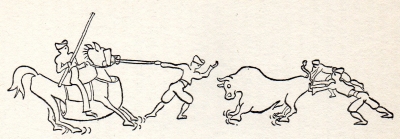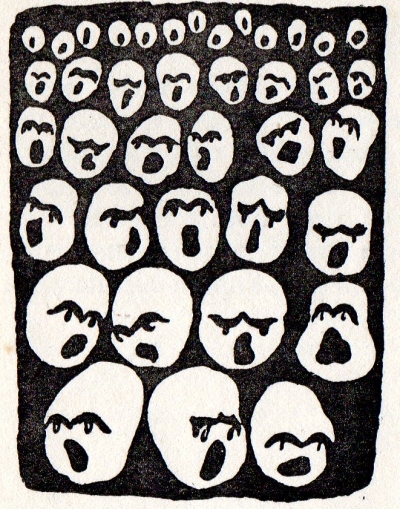Chapter Twenty-six – Lidea Ordinaria (Part Four)
Lidea Ordinaria (Part Four)
THIS corrida was not a good one. The espada risked his life with a courage which was little short of desperate; but the bull gave him no chance to score a hit, and chased him along over the sand, took his muleta away on his horns, and then harried the unprotected matador, who saved himself by getting across the barrier, but lost his sword in the process.
At times this jousting of man and animal is superb; the espada, with is muleta in front of him, tries to lure the animal on; the bull makes a dash at the red rag, the man slips aside, and with his sunken eyes searches for a spot on the bull’s neck where he can fix his weapon. All this is the work of an instant; and then once again, an attack, a feint and a blow which misses its aim. This duel between bull and man is such a strain on the nerves that after a while you feel dazed.
Several times the chulos ran out to relieve the espada, who was on his last legs, but with a yell the public drove them away; thereupon the espada feebly shrugged his shoulders, and once more went for the bull. He squared up to him nicely, but his pinking was a failure. It was not until he was using his fifth sword that the bull succumbed; it was an awful business; when the espada left, he looked as if someone had given him a sound thrashing, and the whole amphitheatre hissed him; I felt more agonizingly sorry for him than for the bull which was breathing his last.

The sixth bull was a huge, white creature weak on his legs and with no more fight in him than a cow; they almost had to push him along before he made an unsteady rush towards the picador’s nag. The toreros with their cloaks drew him along by the horns to make him some sort of opposition; and the banderilleros jumped about in front of him like mad, waving their arms, calling him names and jeering at him, to egg him to what turned out to be a half-hearted and ungainly attack.

The crowd whooped with resentment; they wanted the bull to fight, and the result of this was that worse torture was inflicted on the blood-stained, bellowing animal. I wanted to leave; but the people were standing up, shaking their fists and making a racket; there was no chance of getting through, and so I covered my eyes and waited for it to stop. When, after what seemed an infinitely long time I opened my eyes, the bull was still alive, staggering about on shaky legs.
It was not until the seventh bull came out on the scene that I managed to push my way out. As I rambled through the streets of Seville, I had a queer feeling of shame, but I really do not know whether my callousness or my weakness was the cause of it.
There in the amphitheatre, at one particular moment, I had begun to protest that it was a brutal business; next to me sat a Dutch engineer who had settled in Seville, and he was astonished at my protest.
“This is my ninth corrida,” he said to me, “but it was only the first one which seemed brutal.”
“This was a bad corrida,” a Spaniard informed me by way of soothing my feelings; “but you ought to see what a good one is like.”
Perhaps; but it is hardly likely that I shall ever see a more heartrending figure than that lanky, gaudily-dressed fellow with the face of an ox-herd and woebegone, sunken eyes, whose shoulders were weighed down with the resentment of twenty thousand people. If I had known enough Spanish, I should have gone up to him and said: Juán, things will go wrong with us sometimes; but bitter is the bread of man who depends upon the favour of the public.
And I reflected on this: in Spain I never actually saw the whip used on a horse or a mule; the dogs and cats in the streets are trustful and affectionate, which shows they are well treated. The Spaniards are not cruel to animals.
The corrida is a struggle between man and beast which, in its essentials, is as old as time; it has all the beauty of a struggle, but it pangs as well.
Perhaps the Spaniards can view this beauty and this struggle in so perfect a light that they do not even see the cruelty which accompanies it.
It certainly offers plenty to feast the eyes on, plenty of superb feats of agility, plenty of danger and magnificent courage – but another time I would keep away from a corrida...
...and here the voice of temptation in my heart adds: unless a champion espada were there.
